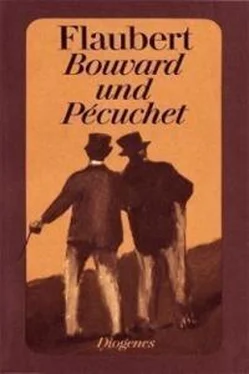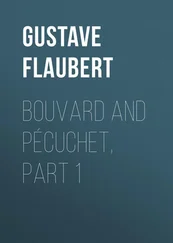"Perhaps so." And Bouvard sank into a reverie.
The expedition to Rome soon began.
At home, through hatred of revolutionary ideas, the leaders of the Parisian middle class got two printing–offices sacked. The great party of order was formed.
It had for its chiefs in the arrondissement the count, Foureau, Marescot, and the curé. Every day, about four o'clock, they walked from one end of the green to the other, and talked over the events of the day. The principal business was the distribution of pamphlets. The titles did not lack attractiveness: "God will be pleased with it"; "The sharing"; "Let us get out of the mess"; "Where are we going?" The finest things among them were the dialogues in the style of villagers, with oaths and bad French, to elevate the mental faculties of the peasants. By a new law, the hawking of pamphlets would be in the hands of the prefects; and they had just crammed Proudhon into St. Pélagie—gigantic triumph!
The trees of liberty were generally torn down. Chavignolles obeyed orders. Bouvard saw with his own eyes the fragments of his poplar on a wheelbarrow. They helped to warm the gendarmes, and the stump was offered to the curé, who had blessed it. What a mockery!
The schoolmaster did not hide his way of thinking.
Bouvard and Pécuchet congratulated him on it one day as they were passing in front of his door. Next day he presented himself at their residence.
At the end of the week they returned his visit.
The day was declining. The brats had just gone home, and the schoolmaster, in half–sleeves, was sweeping the yard. His wife, with a neckerchief tied round her head, was suckling a baby. A little girl was hiding herself behind her petticoat; a hideous–looking child was playing on the ground at her feet. The water from the washing she had been doing in the kitchen was flowing to the lower end of the house.
"You see," said the schoolmaster, "how the government treats us."
And forthwith he began finding fault with capital as an infamous thing. It was necessary to democratise it, to enfranchise matter.
"I ask for nothing better," said Pécuchet.
At least, they ought to have recognised the right to assistance.
"One more right!" said Bouvard.
No matter! The provisional government had acted in a flabby fashion by not ordaining fraternity.
"Then try to establish it."
As there was no longer daylight, Petit rudely ordered his wife to carry a candle to his study.
The lithograph portraits of the orators of the Left were fastened with pins to the plaster walls. A bookshelf stood above a deal writing–desk. There were a chair, stool, and an old soap–box for persons to sit down upon. He made a show of laughing. But want had laid its traces on his cheeks, and his narrow temples indicated the stubbornness of a ram, an intractable pride. He never would yield.
"Besides, see what sustains me!"
It was a pile of newspapers on a shelf, and in feverish phrases he explained the articles of his faith: disarmament of troops, abolition of the magistracy, equality of salaries, a levelling process by which the golden age was to be brought about under the form of the Republic, with a dictator at its head—a fellow that would carry this out for us briskly!
Then he reached for a bottle of aniseed cordial and three glasses, in order to propose the toast of the hero, the immortal victim, the great Maximilian.
On the threshold appeared the black cassock of the priest. Having saluted those present in an animated fashion, he addressed the schoolmaster, speaking almost in a whisper:
"Our business about St. Joseph, what stage is it at?"
"They have given nothing," replied the schoolmaster.
"That is your fault!"
"I have done what I could."
"Ha! really?"
Bouvard and Pécuchet discreetly rose. Petit made them sit down again, and addressing the curé:
"Is that all?"
The Abbé Jeufroy hesitated. Then, with a smile which tempered his reprimand:
"It is supposed that you are rather negligent about sacred history."
"Oh, sacred history!" interrupted Bouvard.
"What fault have you to find with it, sir?"
"I—none. Only there are perhaps more useful things to be learned than the anecdote of Jonas and the story of the kings of Israel."
"You are free to do as you please," replied the priest drily.
And without regard for the strangers, or on account of their presence:
"The catechism hour is too short."
Petit shrugged his shoulders.
"Mind! You will lose your boarders!"
The ten francs a month for these pupils formed the best part of his remuneration. But the cassock exasperated him.
"So much the worse; take your revenge!"
"A man of my character does not revenge himself," said the priest, without being moved. "Only I would remind you that the law of the fifteenth of March assigns us to the superintendence of primary education."
"Ah! I know that well," cried the schoolmaster. "It is given even to colonels of gendarmes. Why not to the rural guard? That would complete the thing!"
And he sank upon the stool, biting his fingers, repressing his rage, stifled by the feeling of his own powerlessness.
The priest touched him lightly on the shoulder.
"I did not intend to annoy you, my friend. Keep yourself quiet. Be a little reasonable. Here is Easter close at hand; I hope you will show an example by going to communion along with the others."
"That is too much! I—I submit to such absurdities!"
At this blasphemy the curé turned pale, his eyeballs gleamed, his jaw quivered.
"Silence, unhappy man! silence! And it is his wife who looks after the church linen!"
"Well, what then? What has she done to you?"
"She always stays away from mass. Like yourself, for that matter!"
"Oh! a schoolmaster is not sent away for a thing of that kind!"
"He can be removed."
The priest said no more.
He was at the end of the room, in the shadow.
Petit was thinking, with his head resting on his chest.
They would arrive at the other end of France, their last sou eaten up by the journey, and they would again find down there, under different names, the same curé, the same superintendent, the same prefect—all, even to the minister, were like links in a chain dragging him down. He had already had one warning—others would follow. After that?—and in a kind of hallucination he saw himself walking along a high–road, a bag on his back, those whom he loved by his side, and his hand held out towards a post–chaise.
At that moment his wife was seized with a fit of coughing in the kitchen, the new–born infant began to squeal, and the boy was crying.
"Poor children!" said the priest in a softened voice.
The father thereupon broke into sobs:
"Yes, yes! whatever you require!"
"I count upon it," replied the curé.
And, having made the customary bow:
"Well, good evening to you, gentlemen."
The schoolmaster remained with his face in his hands.
He pushed away Bouvard. "No! let me alone. I feel as if I'd like to die. I am an unfortunate man."
The two friends, when they reached their own house, congratulated themselves on their independence. The power of the clergy terrified them.
It was now employed for the purpose of strengthening public order. The Republic was about to disappear.
Three millions of electors found themselves excluded from universal suffrage. The security required from newspapers was raised; the press censorship was re–established. It was even suggested that it should be put in force against the fiction columns. Classical philosophy was considered dangerous. The commercial classes preached the dogma of material interests; and the populace seemed satisfied.
The country–people came back to their old masters.
Читать дальше








![Гюстав Флобер - Закат Карфагена [Сборник]](/books/414440/gyustav-flober-zakat-karfagena-sbornik-thumb.webp)


